3 aug 2015
|
|
At around 11:00 PM on the night of August 1st, a fire began in souk of Hebron’s Old City.
The fire was coming from a building that overhangs into the souk from the illegal settlement of Beit Hadassah. The Israeli military came and immediately began detaining Palestinians, saying that the cause of the fire was from a Molotov. Local Palestinians say that they believe it was actually an illegal Israeli settler that threw the Molotov into the house, as a way to cause problems for the Palestinians. No one lived in the house where the Molotov was thrown. The Israeli military presence became massive with about 70 soldiers, border police, and police, as well as army jeeps and a large armored vehicle. |
The military was claiming that there was a homemade bomb in one of the houses. They started to forbid movement and surrounded the area, detaining people for several hours.
They detained eight Palestinians, two of whom were arrested, handcuffed, and blindfolded.
The military, claiming Shalaleh street a closed military zone, announced that if people went any further, they would be arrested. CPTers were also present and documenting the situation. A large military vehicle came out through Bab al Baladia from the illegal settlement. The soldiers began raiding houses, looking for the ‘homemade bomb.’
Eventually, a smaller remote controlled robotic device came out from the back of the large military vehicle. The soldiers said that it would be used to detonate the bomb they claimed was hidden somewhere in the souk. Meanwhile, groups of military and border police were scattered throughout the souk, not allowing people to cross while raiding houses.
A group of 30 soldiers started to force open the gate of a shop with a crowbar in search of a surveillance cameras that may have filmed whatever caused the fire.
The army forced themselves in and broke down the door without even botheriing to ask for the key from the owner of the shop. At this time they also detained a young man near the shop, making him put his head against the wall.
When ISMers were questioning the soldiers about what they were doing, the ‘commander’ told them to back off and then said if he saw them again, he would have them arrested. He also called the soldiers at checkpoint 56 (also known as H1/H2 or Shuhada street checkpoint) and told them to tell the ISMers the same thing. All accounts of the situation vary, but this is the information ISM knows from what was witnessed and from Palestinian sources.
They detained eight Palestinians, two of whom were arrested, handcuffed, and blindfolded.
The military, claiming Shalaleh street a closed military zone, announced that if people went any further, they would be arrested. CPTers were also present and documenting the situation. A large military vehicle came out through Bab al Baladia from the illegal settlement. The soldiers began raiding houses, looking for the ‘homemade bomb.’
Eventually, a smaller remote controlled robotic device came out from the back of the large military vehicle. The soldiers said that it would be used to detonate the bomb they claimed was hidden somewhere in the souk. Meanwhile, groups of military and border police were scattered throughout the souk, not allowing people to cross while raiding houses.
A group of 30 soldiers started to force open the gate of a shop with a crowbar in search of a surveillance cameras that may have filmed whatever caused the fire.
The army forced themselves in and broke down the door without even botheriing to ask for the key from the owner of the shop. At this time they also detained a young man near the shop, making him put his head against the wall.
When ISMers were questioning the soldiers about what they were doing, the ‘commander’ told them to back off and then said if he saw them again, he would have them arrested. He also called the soldiers at checkpoint 56 (also known as H1/H2 or Shuhada street checkpoint) and told them to tell the ISMers the same thing. All accounts of the situation vary, but this is the information ISM knows from what was witnessed and from Palestinian sources.
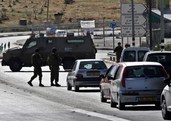
A Palestinian youngster at noontime Monday sustained injuries after he was shot by the Israeli occupation forces (IOF) at the Zaatara military checkpoint, in southern Nablus.
A PIC news reporter quoted eye-witnesses as saying that the IOF troops deployed at the Zaatara checkpoint stopped a vehicle carrying a Palestinian youngster and ordered him to hand his personal ID and leave the car for inspection. But the youngster fled and was immediately shot by the IOF.
The youth reportedly sustained moderate foot injuries.
The Israeli occupation soldiers prevented the ambulance crew who rushed to the scene from transferring the casualty to the hospital to be treated for the inflicted wounds.
Shortly afterwards, the IOF sealed off the roadblock between the northern and southern West Bank areas, blocking the movement of Palestinian vehicles.
Meanwhile, eye-witnesses said Israeli settlers hurled stones at a Palestinian vehicle driving on the Ramallah-Nablus road.
Taxi driver Mousa al-Amala, 50, said his vehicle sustained material damage as a result of the stone-throwing.
Israeli vandals stepped up assaults against Palestinian citizens and properties, a few days after a Palestinian toddler was burned to death by fanatic settlers in Nablus’ town of Duma.
Israeli troops shoot, injure Palestinian youth at northern West Bank checkpoint
On Monday at midday, Israeli soldiers stationed at the Za’atara checkpoint in the northern West Bank shot and wounded a Palestinian youth.
The teen, who has not yet been identified, was standing in line with dozens of other Palestinians when he asked to use the bathroom.
According to soldiers, the young man then attempted to run away. Soldiers shot him in the legs, causing moderate injuries.
The military has closed the checkpoint and is not allowing anyone to pass as of this report. The Za’atara checkpoint connects the central West Bank to the northern part of the West Bank, and its closure creates a chokehold for Palestinians trying to get to school, work or hospitals.
The Monday incident follows several days of escalating attacks by Israeli soldiers and settlers against Palestinian children.
Two seventeen year old boys were shot and killed in separate incidents on Friday – one in Gaza, who was shot for getting too close to an Israeli-controlled ‘buffer zone’ at the Gaza-Israel border, and one in Ramallah at the Qalandia checkpoint.
The deaths of these two children at the hands of Israeli soldiers followed the burning to death of an 18-month old baby by Israeli settlers who threw a firebomb at his family’s home early Friday morning. The baby’s mother, father and 4-year old brother all remain in intensive care with severe burns all over their bodies.
A PIC news reporter quoted eye-witnesses as saying that the IOF troops deployed at the Zaatara checkpoint stopped a vehicle carrying a Palestinian youngster and ordered him to hand his personal ID and leave the car for inspection. But the youngster fled and was immediately shot by the IOF.
The youth reportedly sustained moderate foot injuries.
The Israeli occupation soldiers prevented the ambulance crew who rushed to the scene from transferring the casualty to the hospital to be treated for the inflicted wounds.
Shortly afterwards, the IOF sealed off the roadblock between the northern and southern West Bank areas, blocking the movement of Palestinian vehicles.
Meanwhile, eye-witnesses said Israeli settlers hurled stones at a Palestinian vehicle driving on the Ramallah-Nablus road.
Taxi driver Mousa al-Amala, 50, said his vehicle sustained material damage as a result of the stone-throwing.
Israeli vandals stepped up assaults against Palestinian citizens and properties, a few days after a Palestinian toddler was burned to death by fanatic settlers in Nablus’ town of Duma.
Israeli troops shoot, injure Palestinian youth at northern West Bank checkpoint
On Monday at midday, Israeli soldiers stationed at the Za’atara checkpoint in the northern West Bank shot and wounded a Palestinian youth.
The teen, who has not yet been identified, was standing in line with dozens of other Palestinians when he asked to use the bathroom.
According to soldiers, the young man then attempted to run away. Soldiers shot him in the legs, causing moderate injuries.
The military has closed the checkpoint and is not allowing anyone to pass as of this report. The Za’atara checkpoint connects the central West Bank to the northern part of the West Bank, and its closure creates a chokehold for Palestinians trying to get to school, work or hospitals.
The Monday incident follows several days of escalating attacks by Israeli soldiers and settlers against Palestinian children.
Two seventeen year old boys were shot and killed in separate incidents on Friday – one in Gaza, who was shot for getting too close to an Israeli-controlled ‘buffer zone’ at the Gaza-Israel border, and one in Ramallah at the Qalandia checkpoint.
The deaths of these two children at the hands of Israeli soldiers followed the burning to death of an 18-month old baby by Israeli settlers who threw a firebomb at his family’s home early Friday morning. The baby’s mother, father and 4-year old brother all remain in intensive care with severe burns all over their bodies.
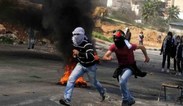
A wave of violent confrontations broke out at dawn Monday after the Israeli occupation forces (IOF) rolled into Jenin’s southern town of Yabad and attacked the Palestinian unarmed protesters with tear gas canisters.
Eye-witnesses said over 10 army jeeps raided Yabad, spurring clashes across the town.
Dozens of olive trees planted in al-Maloul neighborhood were reduced to ashes due to the heavy spates of tear gas randomly discharged by the IOF.
The Palestinian protesters responded to the assault by hurling stones at the Israeli occupation soldiers.
The IOF further broke into two Palestinian homes, wreaked havoc on them, and attacked their owners.
The IOF sealed off the access road to the town with makeshift roadblocks, where Palestinian vehicles and citizens have been meticulously inspected.
Eye-witnesses said over 10 army jeeps raided Yabad, spurring clashes across the town.
Dozens of olive trees planted in al-Maloul neighborhood were reduced to ashes due to the heavy spates of tear gas randomly discharged by the IOF.
The Palestinian protesters responded to the assault by hurling stones at the Israeli occupation soldiers.
The IOF further broke into two Palestinian homes, wreaked havoc on them, and attacked their owners.
The IOF sealed off the access road to the town with makeshift roadblocks, where Palestinian vehicles and citizens have been meticulously inspected.
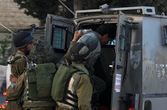
Israeli soldiers invaded, earlier Monday, Beit Ummar town, north of the southern West Bank district of Hebron, and kidnapped two Palestinian teenagers. One Palestinian injured near Nablus.
Mohammad Awad, coordinator of the Popular Committee against the Wall and Settlements in Beit Ummar, has reported that several army vehicles invaded the town, before the soldiers searched homes, and kidnapped two Palestinians.
Awad added that the kidnapped have been identified as Hamza Mohammad Ekhlayyel, 18, and Nour Riyad ‘Arar, 19; both were moved to the Etzion military and security base for interrogation.
It is worth mentioning that the soldiers have kidnapped five Palestinians, including three former political prisoners in Beit Ummar, in less than 48 hours.
In addition, soldiers invaded ath-Thaheriyya and Yatta towns, in addition to several neighborhoods in Hebron city, and installed roadblocks on Hebron’s northern roads, in addition to the main roads leading to Sa’ir and Halhoul towns, east of the city.
The army stopped and searched dozens of Palestinian cars, and questioned scores of residents while inspecting their ID cards.
In related news, soldiers shot and injured a young Palestinian man at the Za’tara roadblock, near the northern West Bank city of Nablus. The man was shot in the leg before the soldiers closed the roadblock.
The army closed the roadblock after the shooting, and prevented Palestinian medics from reaching the wounded man.
Mohammad Awad, coordinator of the Popular Committee against the Wall and Settlements in Beit Ummar, has reported that several army vehicles invaded the town, before the soldiers searched homes, and kidnapped two Palestinians.
Awad added that the kidnapped have been identified as Hamza Mohammad Ekhlayyel, 18, and Nour Riyad ‘Arar, 19; both were moved to the Etzion military and security base for interrogation.
It is worth mentioning that the soldiers have kidnapped five Palestinians, including three former political prisoners in Beit Ummar, in less than 48 hours.
In addition, soldiers invaded ath-Thaheriyya and Yatta towns, in addition to several neighborhoods in Hebron city, and installed roadblocks on Hebron’s northern roads, in addition to the main roads leading to Sa’ir and Halhoul towns, east of the city.
The army stopped and searched dozens of Palestinian cars, and questioned scores of residents while inspecting their ID cards.
In related news, soldiers shot and injured a young Palestinian man at the Za’tara roadblock, near the northern West Bank city of Nablus. The man was shot in the leg before the soldiers closed the roadblock.
The army closed the roadblock after the shooting, and prevented Palestinian medics from reaching the wounded man.
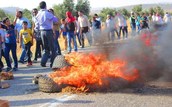
Violent clashes broke out at late hours Sunday between Israeli Occupation Forces (IOF) and Palestinian youths at the entrance to Duma town south of Nablus, that witnessed few days ago the settlers’ arson attack on a safe family.
The confrontations erupted when IOF prevented a delegation coming from Ramallah from having access to the town to offer condolences to the arson attack victims, the PIC reporter quoted eyewitnesses as saying.
Dozens of local youths suffered tear-gas inhalation as IOF heavily fired tear gas bombs and rubber bullets during the clashes, which subsequently started fire in nearby agricultural fields.
Daily clashes have been reported in Duma town after a group of Jewish settlers deliberately set fire in two local homes. A Palestinian toddler was burned to death while three of his family members were seriously injured during the arson attack.
The confrontations erupted when IOF prevented a delegation coming from Ramallah from having access to the town to offer condolences to the arson attack victims, the PIC reporter quoted eyewitnesses as saying.
Dozens of local youths suffered tear-gas inhalation as IOF heavily fired tear gas bombs and rubber bullets during the clashes, which subsequently started fire in nearby agricultural fields.
Daily clashes have been reported in Duma town after a group of Jewish settlers deliberately set fire in two local homes. A Palestinian toddler was burned to death while three of his family members were seriously injured during the arson attack.
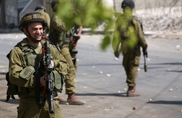
Palestinian security sources from Hebron's Old City, today, said that Israeli soldiers have brutally attacked a Palestinian youth and, then, forced him to drink gasoline.
Sources said, according to the PNN, that soldiers handcuffed Majdi Al-Muhtaseb (21), kidnapped and dragged him to Al-Turba neighborhood, in Tel Rumeida, threw him to the ground and started beating and kicking him for no reason whatsoever.
According to Majdi’s family, the soldiers asked him if he wanted water, and, when he said yes, one of them pretended to be helping him to drink water. When he realized that it was gasoline and not water, the soldier forced him to drink out of it.
Issam Al-Muhtaseb, father of the youth, said that Israeli forces have detained his son and destroyed his own ID card. Then, they beat him on his back and stomach.
After the soldiers let him go, the youth’s father took him to ‘Aalia hospital, in Hebron, where he suffered from severe pains and underwent medical tests.
Majdi was moved back to his house, but reportedly still suffers from back-pain.
Sources said, according to the PNN, that soldiers handcuffed Majdi Al-Muhtaseb (21), kidnapped and dragged him to Al-Turba neighborhood, in Tel Rumeida, threw him to the ground and started beating and kicking him for no reason whatsoever.
According to Majdi’s family, the soldiers asked him if he wanted water, and, when he said yes, one of them pretended to be helping him to drink water. When he realized that it was gasoline and not water, the soldier forced him to drink out of it.
Issam Al-Muhtaseb, father of the youth, said that Israeli forces have detained his son and destroyed his own ID card. Then, they beat him on his back and stomach.
After the soldiers let him go, the youth’s father took him to ‘Aalia hospital, in Hebron, where he suffered from severe pains and underwent medical tests.
Majdi was moved back to his house, but reportedly still suffers from back-pain.
2 aug 2015
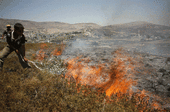
A horde of Israeli settlers at dawn Sunday set fire to dozens of Palestinian olive orchards and cultivated lands in al-Mugheir village, east of Ramallah city, moments after they failed to torch a Palestinian family home.
Eye-witnesses said a gang of Israeli vandals residing in an illegal nearby settlement tried to burn down a Palestinian family home before they were stopped by the local residents.
The Israeli occupation forces showed up at the scene and attacked the Palestinian locals with random spates of tear gas canisters and rubber bullets.
Meanwhile, Palestinian cultivated lands and olive orchards went up in flames after the Israeli vandals sneaked into the Rafid area, in al-Mugheir, and reduced over 50 olive trees to ashes.
In the meantime, three unidentified Palestinian youngsters were heavily beaten by Israeli occupation soldiers and dragged to an unknown location via Israeli ambulances.
A number of Palestinians sustained wounds and others choked on tear gas in the clashes that burst out in the area.
Earlier, on Saturday evening, the woods of the Quds University, in Jerusalem’s town of Abu Dis, burst into flames after Israeli soldiers showered the area with tear gas canisters and stun grenades in an attempt to disband non-violent Palestinian marchers.
Red Crescent and civil defense crews rushed to the area to put out the wild fire.
Eye-witnesses said a gang of Israeli vandals residing in an illegal nearby settlement tried to burn down a Palestinian family home before they were stopped by the local residents.
The Israeli occupation forces showed up at the scene and attacked the Palestinian locals with random spates of tear gas canisters and rubber bullets.
Meanwhile, Palestinian cultivated lands and olive orchards went up in flames after the Israeli vandals sneaked into the Rafid area, in al-Mugheir, and reduced over 50 olive trees to ashes.
In the meantime, three unidentified Palestinian youngsters were heavily beaten by Israeli occupation soldiers and dragged to an unknown location via Israeli ambulances.
A number of Palestinians sustained wounds and others choked on tear gas in the clashes that burst out in the area.
Earlier, on Saturday evening, the woods of the Quds University, in Jerusalem’s town of Abu Dis, burst into flames after Israeli soldiers showered the area with tear gas canisters and stun grenades in an attempt to disband non-violent Palestinian marchers.
Red Crescent and civil defense crews rushed to the area to put out the wild fire.
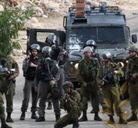
Palestinian medical sources have reported, on Saturday evening, that several residents received treatment for the effects of tear gas inhalation, after Israeli soldiers fired gas bombs at homes in Beit Ummar town, north of the southern West Bank city of Hebron. Army also kidnapped a Palestinian, and wounded another.
Media spokesperson of the Popular Committee against the Wall and Settlements in Beit Ummar, Mohammad ‘Ayyad ‘Awad, has reported that several Israeli military vehicles invaded the ath-Thaher area, in the town, and clashed with local youths.
The army fired rubber-coated metal bullets, and several gas bombs, causing many residents to suffer the effects of tear gas inhalation.
Soldiers also detained a few residents, and used them as human shields while advancing into the town’s neighborhoods.
In addition, several soldiers attacked and violently beat a young Palestinian man, identified as Anas at-Tubasi, near the Etzion Junction, causing a head injury.
Local medics moved the wounded Palestinian to the Hebron Governmental Hospital.
‘Awad also stated that the army kidnapped ‘Ayesh Sabri ‘Awad, 20 years of age, after stopping him on a sudden roadblock, at the main entrance of Beit Ummar.
Media spokesperson of the Popular Committee against the Wall and Settlements in Beit Ummar, Mohammad ‘Ayyad ‘Awad, has reported that several Israeli military vehicles invaded the ath-Thaher area, in the town, and clashed with local youths.
The army fired rubber-coated metal bullets, and several gas bombs, causing many residents to suffer the effects of tear gas inhalation.
Soldiers also detained a few residents, and used them as human shields while advancing into the town’s neighborhoods.
In addition, several soldiers attacked and violently beat a young Palestinian man, identified as Anas at-Tubasi, near the Etzion Junction, causing a head injury.
Local medics moved the wounded Palestinian to the Hebron Governmental Hospital.
‘Awad also stated that the army kidnapped ‘Ayesh Sabri ‘Awad, 20 years of age, after stopping him on a sudden roadblock, at the main entrance of Beit Ummar.
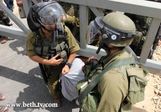
Several family members have been mildly wounded, after being attacked in their own home, when a number of Israeli military vehicles invaded the Um Rokba area in the al-Khader town, south of Bethlehem.
Ahmad Salah, coordinator of the Popular Committee against the Wall and Settlements, has reported that the soldiers invaded the home of Wael Ali Salah, after firing concussion grenades at it.
Salah added that the soldiers attacked several family members while searching their property, causing them to suffer cuts and bruises.
In addition, soldiers clashed with dozens of local youths, and fired gas bombs and concussion grenades on them, before chasing many Palestinians in the town’s streets and neighborhoods. No arrest were reported.
Ahmad Salah, coordinator of the Popular Committee against the Wall and Settlements, has reported that the soldiers invaded the home of Wael Ali Salah, after firing concussion grenades at it.
Salah added that the soldiers attacked several family members while searching their property, causing them to suffer cuts and bruises.
In addition, soldiers clashed with dozens of local youths, and fired gas bombs and concussion grenades on them, before chasing many Palestinians in the town’s streets and neighborhoods. No arrest were reported.
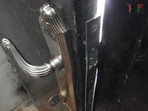
On Tuesday, July 28, at 2:40 pm, the Israeli army arrived to the village of Azzun, located in the district of Qalqilya, to block 3 of the 4 existing entrance gates. Since the 4th gate (east side), which leads to an illegal settlement, has been permanently closed since 1992, this situation left all the inhabitants trapped in their village.
Both northern gates, leading to Nablus and Tulkarem, were blocked allowing no cars to pass, only people by foot, until 8:00 in the morning of the following day. In addition, three new checkpoints were created in these two north gates as well as the western gate leading to Qalqilya.
This event should be seen in the larger context of violence, control and surveillance to which the village of Azzun has been subjected to. The main road 55 that connects the village to Nablus, is fenced through 40 kilometers and includes three watchtowers, making villagers feel constantly threatened and controlled. Moreover, the nearby illegal settlement of Maale Shomeron has a large number of watchtowers that constantly surveil the villagers’ movements within Azzun.
In the course of the previous year, the village suffered from 385 attacks from the army, totaling more than one attack per day. These raids would sometimes be performed as training for the soldiers, at other times to directly arrest people, and overall to intimidate and cause fear among the villagers.
On Wednesday, July 29, at 2:30 am, the Israeli army raided 10 houses in the village of Azzun, arresting two 19 year old boys, Samir Shbeitah and Mohammed Salim.
Samir’s brother, Sannad, informed ISM that the soldiers violently exploded the entrance door of the house in order to wake up and shock the whole family. As the family had not been completely woken up, the soldiers, all wearing black masks, ran upstairs to the terrace where the brothers had been sleeping, to begin frightening the family by creating loud noise and trashing the house. They would hit their guns against the tin roof of the terrace and point laser beam lights into the brothers’ eyes.
Samir, Sannad, and their younger brother Samer, were separated form their mother in different rooms. Samir was taken back to the terrace with 15 soldiers, leaving Sannad and Samer with 4 soldiers. After approximately one hour, an officer came with 8 jeeps and more soldiers, asked Samir for his ID and arrested him, taking with him only the clothes he was wearing.
An Israeli authority called Samir’s father to inform him that his son is in a prison in Huwara. His father asked why his son had been arrested; the officer gave no answer. Samir’s father is thinking whether he can pay the 4.000 shekel fine the Israeli authority demands in order to free his son, or get a lawyer, but the family is very poor.
This is the third attack this family has suffered in three years. In very similar conditions, Samir was arrested for the first time in 2012 when he was 15 years old, imprisoned for a period of 2 and a half years, with no charges.
During the second attack to his house, there was no arrest, but the family suffered similar violence, including breaking all the doors of their home and writing graffiti on their walls in English and Hebrew, which they could not understand.
These kind of raids in the village are very common, and mostly occur during the night, violently waking up the families in the middle of their sleep, and many times making them wait outside their homes, even during the winter.
Azzun is a village that also suffers from the Israeli army’s tactic called ‘practical punishment’. When someone within a family is arrested, the rest of his brothers and sons would be forbidden to continue working in Israel, by taking away their work permits within 24 hours. This has impacted the village’s high rate of unemployment, raising it to 39%, the highest unemployment rate in the West Bank.
Azzun suffers from an average of 175 arrests per year, where 65% of the detainees are under the age of 18, making this the highest number of child arrests in the West Bank.
In 2012, 150 children were arrested in Azzun. Child arrests, who are normally imprisoned for a week or short periods of time, is a clear tactic of the Israeli army to cause fear and trauma, generating high levels of Post Traumatic Stress Disorder.
Both northern gates, leading to Nablus and Tulkarem, were blocked allowing no cars to pass, only people by foot, until 8:00 in the morning of the following day. In addition, three new checkpoints were created in these two north gates as well as the western gate leading to Qalqilya.
This event should be seen in the larger context of violence, control and surveillance to which the village of Azzun has been subjected to. The main road 55 that connects the village to Nablus, is fenced through 40 kilometers and includes three watchtowers, making villagers feel constantly threatened and controlled. Moreover, the nearby illegal settlement of Maale Shomeron has a large number of watchtowers that constantly surveil the villagers’ movements within Azzun.
In the course of the previous year, the village suffered from 385 attacks from the army, totaling more than one attack per day. These raids would sometimes be performed as training for the soldiers, at other times to directly arrest people, and overall to intimidate and cause fear among the villagers.
On Wednesday, July 29, at 2:30 am, the Israeli army raided 10 houses in the village of Azzun, arresting two 19 year old boys, Samir Shbeitah and Mohammed Salim.
Samir’s brother, Sannad, informed ISM that the soldiers violently exploded the entrance door of the house in order to wake up and shock the whole family. As the family had not been completely woken up, the soldiers, all wearing black masks, ran upstairs to the terrace where the brothers had been sleeping, to begin frightening the family by creating loud noise and trashing the house. They would hit their guns against the tin roof of the terrace and point laser beam lights into the brothers’ eyes.
Samir, Sannad, and their younger brother Samer, were separated form their mother in different rooms. Samir was taken back to the terrace with 15 soldiers, leaving Sannad and Samer with 4 soldiers. After approximately one hour, an officer came with 8 jeeps and more soldiers, asked Samir for his ID and arrested him, taking with him only the clothes he was wearing.
An Israeli authority called Samir’s father to inform him that his son is in a prison in Huwara. His father asked why his son had been arrested; the officer gave no answer. Samir’s father is thinking whether he can pay the 4.000 shekel fine the Israeli authority demands in order to free his son, or get a lawyer, but the family is very poor.
This is the third attack this family has suffered in three years. In very similar conditions, Samir was arrested for the first time in 2012 when he was 15 years old, imprisoned for a period of 2 and a half years, with no charges.
During the second attack to his house, there was no arrest, but the family suffered similar violence, including breaking all the doors of their home and writing graffiti on their walls in English and Hebrew, which they could not understand.
These kind of raids in the village are very common, and mostly occur during the night, violently waking up the families in the middle of their sleep, and many times making them wait outside their homes, even during the winter.
Azzun is a village that also suffers from the Israeli army’s tactic called ‘practical punishment’. When someone within a family is arrested, the rest of his brothers and sons would be forbidden to continue working in Israel, by taking away their work permits within 24 hours. This has impacted the village’s high rate of unemployment, raising it to 39%, the highest unemployment rate in the West Bank.
Azzun suffers from an average of 175 arrests per year, where 65% of the detainees are under the age of 18, making this the highest number of child arrests in the West Bank.
In 2012, 150 children were arrested in Azzun. Child arrests, who are normally imprisoned for a week or short periods of time, is a clear tactic of the Israeli army to cause fear and trauma, generating high levels of Post Traumatic Stress Disorder.
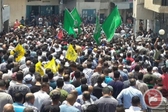
Israeli forces shot and injured at least eight Palestinians with rubber-coated steel bullets during clashes near al-Jalazun refugee camp that broke out on Saturday, following the funeral of 17-year-old Laith al-Khaldi, who was shot dead by Israeli forces the day before.
Israeli forces reportedly fired live and rubber-coated steel rounds at dozens of Palestinian youth as they marched toward the illegal Israeli settlement of Beit El, northern Ramallah district, following Khaldi's funeral. An Israeli army spokesperson said she was looking into the incident.
Witnesses said that settlers also opened fire on the demonstrators, according to Ma'an.
Palestinian youth threw rocks and Molotov cocktails at Israeli forces and settlers in response, and the Molotov cocktails reportedly set fire to grass near the settlement.
The injured Palestinians were taken to the Ramallah Governmental Hospital for treatment.
Israeli forces reportedly targeted journalists and medical teams with tear-gas canisters during the clashes. Khaldi was fatally shot by Israeli forces during clashes atAtaraIsraeli military checkpoint near Ramallah late on Friday.
The 17-year-old was shot in the chest and later died from his injuries at the Palestine Medical Complex after two surgeries failed to save him.
He was at least the 20th Palestinian to be killed by Israeli forces this year, not including those killed in attacks by Israeli settlers.
Israeli forces shot dead another 17-year-old Palestinian on Friday evening near the Israeli "buffer zone" in the Gaza Strip, and earlier on Friday, an 18-month-old infant was killed in an arson attack carried out by Israeli settlers in southern Nablus.
Jalazun refugee camp has been the site of frequent clashes with Israeli forces in the past.
Earlier this year, the head of a local popular committee, Mahmoud Mubarak, said that the camp was being "systematically and unnaturally" attacked by Israel, with clashes breaking out on a near-daily basis.
Khaldi was the second Palestinian from the camp to be killed this year, after Ali Mahmoud Safi, 20, was fatally shot during a protest near Ramallah in March.
Mubarak said that four residents of the refugee camp were killed by Israeli forces last year.
Israeli forces reportedly fired live and rubber-coated steel rounds at dozens of Palestinian youth as they marched toward the illegal Israeli settlement of Beit El, northern Ramallah district, following Khaldi's funeral. An Israeli army spokesperson said she was looking into the incident.
Witnesses said that settlers also opened fire on the demonstrators, according to Ma'an.
Palestinian youth threw rocks and Molotov cocktails at Israeli forces and settlers in response, and the Molotov cocktails reportedly set fire to grass near the settlement.
The injured Palestinians were taken to the Ramallah Governmental Hospital for treatment.
Israeli forces reportedly targeted journalists and medical teams with tear-gas canisters during the clashes. Khaldi was fatally shot by Israeli forces during clashes atAtaraIsraeli military checkpoint near Ramallah late on Friday.
The 17-year-old was shot in the chest and later died from his injuries at the Palestine Medical Complex after two surgeries failed to save him.
He was at least the 20th Palestinian to be killed by Israeli forces this year, not including those killed in attacks by Israeli settlers.
Israeli forces shot dead another 17-year-old Palestinian on Friday evening near the Israeli "buffer zone" in the Gaza Strip, and earlier on Friday, an 18-month-old infant was killed in an arson attack carried out by Israeli settlers in southern Nablus.
Jalazun refugee camp has been the site of frequent clashes with Israeli forces in the past.
Earlier this year, the head of a local popular committee, Mahmoud Mubarak, said that the camp was being "systematically and unnaturally" attacked by Israel, with clashes breaking out on a near-daily basis.
Khaldi was the second Palestinian from the camp to be killed this year, after Ali Mahmoud Safi, 20, was fatally shot during a protest near Ramallah in March.
Mubarak said that four residents of the refugee camp were killed by Israeli forces last year.
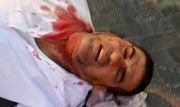
A Palestinian young man on Sunday sustained serious wounds after he was aggressively attacked by three fanatic Israelis on his way back home from dawn prayers at the Grand Mosque in Lod city.
The Palestinians of 48 Website quoted eye-witnesses as reporting that they found the citizen Imad Abu Sharkh lying on the ground and covered in blood. They said his body and head bore signs of heavy beating with sharp objects.
Speaking to the Palestinians of 48 Website, Abu Sharkh said he was brutally attacked by three settlers hiding near his house.
“They thought I breathed my last when I fell over and fled right away. My neighbors rushed me to the hospital while I was bleeding,” the casualty said. “I called the police and kept waiting for an hour’s time but they did not show up.”
The casualty’s daughter said her father’s wounds prove he was subjected to a murder attempt.
She spoke out against the deliberate medical neglect perpetrated by Israeli medics against her father at the Assaf Harofeh hospital, adding that the ambulance showed up at the scene one hour later.
The Palestinians of 48 Website quoted eye-witnesses as reporting that they found the citizen Imad Abu Sharkh lying on the ground and covered in blood. They said his body and head bore signs of heavy beating with sharp objects.
Speaking to the Palestinians of 48 Website, Abu Sharkh said he was brutally attacked by three settlers hiding near his house.
“They thought I breathed my last when I fell over and fled right away. My neighbors rushed me to the hospital while I was bleeding,” the casualty said. “I called the police and kept waiting for an hour’s time but they did not show up.”
The casualty’s daughter said her father’s wounds prove he was subjected to a murder attempt.
She spoke out against the deliberate medical neglect perpetrated by Israeli medics against her father at the Assaf Harofeh hospital, adding that the ambulance showed up at the scene one hour later.
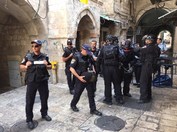
Israeli cops and fanatic settlers stormed Muslims’ holy al-Aqsa Mosque on early Sunday morning, sparking tension around the holy shrine.
Sources from inside al-Aqsa said large numbers of peaceful Muslim worshipers and sit-inners have been maintaining vigil in the Mosque's plazas and the Qibli Mosque since the early morning hours.
Heavily-armed Israeli officers unleashed a barrage of rubber bullets so as to evacuate the Qibli Mosque and pave the way for storming the holy shrine.
Israeli organizations of the alleged temple mount launched calls for stepping up mass break-ins at al-Aqsa on Sunday under the slogan “the return of all Jews to the temple.”
The Israeli police reportedly tightened it grip and sealed off the main entrances to al-Aqsa.
The Israeli cops have also come down heavily on the non-violent female and male Muslim congregations, denying those below 50 years of age the right to enter the Mosque.
Sources from inside al-Aqsa said large numbers of peaceful Muslim worshipers and sit-inners have been maintaining vigil in the Mosque's plazas and the Qibli Mosque since the early morning hours.
Heavily-armed Israeli officers unleashed a barrage of rubber bullets so as to evacuate the Qibli Mosque and pave the way for storming the holy shrine.
Israeli organizations of the alleged temple mount launched calls for stepping up mass break-ins at al-Aqsa on Sunday under the slogan “the return of all Jews to the temple.”
The Israeli police reportedly tightened it grip and sealed off the main entrances to al-Aqsa.
The Israeli cops have also come down heavily on the non-violent female and male Muslim congregations, denying those below 50 years of age the right to enter the Mosque.
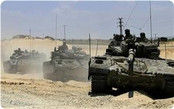
The Israeli occupation forces (IOF) on Sunday morning opened fire at Palestinian farmers and fishermen in different locations of the Gaza Strip, with no reported casualties.
Local sources told Quds Press that Israeli border troops opened machinegun fire heavily at farmers and homes to the east of Johr Addik area and al-Maghazi refugee camp.
They also reported unusual military moves amid intensive drone overflights along the eastern border of Gaza.
The Israeli navy also opened machinegun fire this morning at Palestinian fishing boats off the northern coast of Gaza.
The intensity of shooting forced the fishermen on these boats to return to the shore.
Local sources told Quds Press that Israeli border troops opened machinegun fire heavily at farmers and homes to the east of Johr Addik area and al-Maghazi refugee camp.
They also reported unusual military moves amid intensive drone overflights along the eastern border of Gaza.
The Israeli navy also opened machinegun fire this morning at Palestinian fishing boats off the northern coast of Gaza.
The intensity of shooting forced the fishermen on these boats to return to the shore.
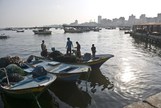
Israeli naval forces on Sunday morning fired gunshots at Palestinian fishermen sailing off the coast of the Gaza Strip, witnesses said.
Witnesses said the forces fired machine guns at Palestinian fishing boats off the coast of al-Waha as well Sudaniyya located in the northwestern Gaza Strip, adding that no injuries were reported.
An Israeli army spokesperson had no immediate information and told Ma'an she would look into the incident.
Palestinian fishermen face daily risks in order to make a living, including routine harrassment from Israeli naval forces, confiscation of boats and materials, detention, and potentially death.
At least three Palestinian fishermen have been shot dead by Israeli forces since September.Israeli forces often allege that fishermen deviate from the designated fishing zone and pose a security threat.
The exact limits of the zone set by Israeli authorities are often ambiguous and Israeli authorities have not abided by the fishing zone agreed upon in last summer's ceasefire agreement, rights groups say.
The attacks come despite Israeli promises at the end of the ceasefire to ease restrictions on Palestinian access to both the sea and the border region near the "security buffer zone."
Witnesses said the forces fired machine guns at Palestinian fishing boats off the coast of al-Waha as well Sudaniyya located in the northwestern Gaza Strip, adding that no injuries were reported.
An Israeli army spokesperson had no immediate information and told Ma'an she would look into the incident.
Palestinian fishermen face daily risks in order to make a living, including routine harrassment from Israeli naval forces, confiscation of boats and materials, detention, and potentially death.
At least three Palestinian fishermen have been shot dead by Israeli forces since September.Israeli forces often allege that fishermen deviate from the designated fishing zone and pose a security threat.
The exact limits of the zone set by Israeli authorities are often ambiguous and Israeli authorities have not abided by the fishing zone agreed upon in last summer's ceasefire agreement, rights groups say.
The attacks come despite Israeli promises at the end of the ceasefire to ease restrictions on Palestinian access to both the sea and the border region near the "security buffer zone."
1 aug 2015
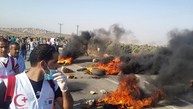
Dozens of Palestinian youths were injured on Saturday evening in violent clashes which erupted as Israeli occupation forces attacked Palestinians protesters in Duma town in southern Nablus city.
PIC reporter revealed that injuries included suffocation and wounds caused by rubber-coated metal bullets.
Omar Dawabsheh revealed that over 35 young men suffered suffocation by tear gas or being shot by rubber bullets in clashes that followed Israel's crack down on a march organized by Duma’s inhabitants in protest against burning the infant Ali Dawabsheh on Friday.
Omar Dawabsheh pointed out that ambulances rushed to the scene and offered aid to the wounded.
"The Palestinians retreated into the town after they had been surrounded by Israeli soldiers who were firing tear gas and rubber bullets," he added.
Ghassan Daghlas, the official of settlement file, told the PIC reporter that clashes erupted when Israeli soldiers stationed at the entrances of Duma town and stopped the march and attempted to quell it. The Palestinians replied by torching tires and throwing stones at soldiers who fired tear gas and stun grenades directly at protesters.
PIC reporter revealed that injuries included suffocation and wounds caused by rubber-coated metal bullets.
Omar Dawabsheh revealed that over 35 young men suffered suffocation by tear gas or being shot by rubber bullets in clashes that followed Israel's crack down on a march organized by Duma’s inhabitants in protest against burning the infant Ali Dawabsheh on Friday.
Omar Dawabsheh pointed out that ambulances rushed to the scene and offered aid to the wounded.
"The Palestinians retreated into the town after they had been surrounded by Israeli soldiers who were firing tear gas and rubber bullets," he added.
Ghassan Daghlas, the official of settlement file, told the PIC reporter that clashes erupted when Israeli soldiers stationed at the entrances of Duma town and stopped the march and attempted to quell it. The Palestinians replied by torching tires and throwing stones at soldiers who fired tear gas and stun grenades directly at protesters.

The Israeli occupation army on Friday intensified its military presence along the Gaza border for fear of reprisals from the Palestinian resistance following the settlers' deadly arson attack on a Palestinian family in Nablus.
An informed local source told Quds Press that the Israeli army started yesterday afternoon to dispatch more troops along the eastern and northern borders of Gaza.
He expressed his belief that the Israelis fear that the resistance in Gaza might carry out attacks against Israeli targets in retaliation to the death of a Palestinian toddler and the injury of his family in Nablus during an arson attack on their house by Jewish settlers.
These military deployments and moves have been taking place concurrently with sporadic Israeli gunfire attacks on populated areas to the east of Gaza.
An informed local source told Quds Press that the Israeli army started yesterday afternoon to dispatch more troops along the eastern and northern borders of Gaza.
He expressed his belief that the Israelis fear that the resistance in Gaza might carry out attacks against Israeli targets in retaliation to the death of a Palestinian toddler and the injury of his family in Nablus during an arson attack on their house by Jewish settlers.
These military deployments and moves have been taking place concurrently with sporadic Israeli gunfire attacks on populated areas to the east of Gaza.
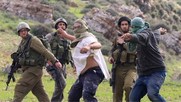
Violent clashes broke out Saturday morning after a group of settlers attacked dozens of Palestinian farmers in Qasra town in Nablus under the protection of Israeli Occupation Forces (IOF).
Head of the village council Abdel Azim Wadi told the PIC reporter that nearly 20 settlers violently stormed the area and attacked local farmers, preventing them from completing their work.
Dozens of local citizens rushed to the area and clashed with the invading settlers.
IOF soldiers immediately came to the agricultural land and started firing tear gas bombs at the Palestinians, causing many injuries among them.
Head of the village council Abdel Azim Wadi told the PIC reporter that nearly 20 settlers violently stormed the area and attacked local farmers, preventing them from completing their work.
Dozens of local citizens rushed to the area and clashed with the invading settlers.
IOF soldiers immediately came to the agricultural land and started firing tear gas bombs at the Palestinians, causing many injuries among them.
